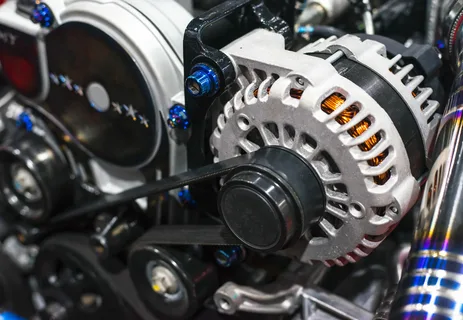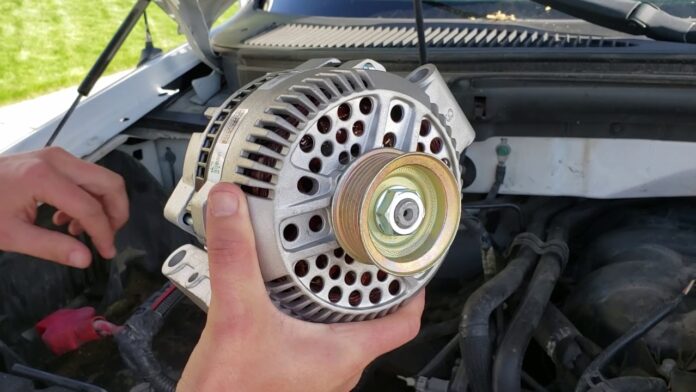Every Holden Viva owner knows the importance of a well-functioning vehicle. Among its many components, the alternator plays a vital role in keeping your car running smoothly. Unfortunately, like any part of your vehicle, it can wear out over time. Recognizing the signs that indicate an alternator replacement is needed can save you from unexpected breakdowns and costly repairs down the road.
Is your Holden Viva Alternator showing some unusual behavior? From flickering headlights to dashboard warning lights, various symptoms could signal trouble with your alternator. Understanding these signs is essential for maintaining not only performance but also safety on the road.
Understanding The Role of The Alternator in Your Holden Viva
The alternator is a crucial component in your Holden Viva. It works tirelessly to convert mechanical energy into electrical energy, ensuring your vehicle’s battery remains charged. This process supports all the electrical systems in your car.
When you start the engine, the alternator takes over from the battery. Its primary function is to keep the battery charged while powering everything from headlights to infotainment systems. Without it, you’d find yourself stranded with a dead battery sooner rather than later.
Understanding how your alternator operates can help you spot potential issues early on. A healthy alternator maintains a steady voltage output, typically between 13.8 and 14.4 volts when running smoothly. If this fluctuates or drops significantly, trouble may be lurking.
Additionally, the alternator plays an essential role during high-demand situations like using air conditioning or charging devices through USB ports. When under strain, it needs to generate enough power without faltering.
Regular maintenance checks can ensure that your Holden Viva’s alternator functions optimally throughout its lifespan. By staying aware of its performance, you’re taking proactive steps toward avoiding costly repairs down the line.
Warning Lights on Your Dashboard
Dashboard warning lights are your Holden Viva’s way of communicating with you. When the alternator starts to fail, specific warning lights may illuminate. Keep an eye out for the battery light or any related indicators that signify electrical system issues.
The battery light is particularly telling. If it flickers or stays on while driving, it’s often a sign that your alternator isn’t generating enough power to recharge the battery as needed. Don’t ignore this alert; it could lead to more significant problems down the road.
In some cases, other dashboard symbols might appear alongside these warnings. For example, if you notice a drop in voltage readings on your gauge cluster, it can signal that your alternator isn’t performing correctly. This situation demands immediate attention.
Pay close attention during nighttime driving too. If your dashboard lights behave oddly—flickering or dimming—it’s another clue pointing towards potential alternator failure.
Ignoring these warning signs can have serious consequences for both safety and vehicle performance. Always take dashboard alerts seriously; they provide critical information about what’s happening under the hood of your Holden Viva.
Electrical Failures: A Common Symptom of Alternator Issues
Electrical failures in your Holden Viva can be a frustrating experience. These issues often manifest suddenly, leaving drivers puzzled about the cause. One of the primary culprits behind these malfunctions is a failing alternator.
When the alternator struggles to generate sufficient power, various electrical components may start to malfunction. This includes everything from your radio and air conditioning to power windows and interior lights. You might notice that some features operate erratically or not at all.
Inconsistent performance across electrical systems can also signal deeper problems with the alternator’s output. Imagine driving only to find that your dashboard lights flicker or go dark entirely—it’s unsettling and dangerous. Such symptoms should prompt immediate attention.
Another common sign of an alternator issue is when electronic devices seem sluggish or unresponsive. If you’re experiencing delays when starting up your infotainment system or if automatic windows take longer than usual, it could indicate an insufficient power supply from the alternator.
Ignoring these electrical failures isn’t advisable. They might lead to more significant problems down the line, affecting not just convenience but safety as well. Addressing potential alternator issues sooner rather than later can save you time and money on repairs.
Dimming Or Flickering Headlights
Dimming or flickering headlights can be a frustrating experience for any driver. If you notice that your Holden Viva’s headlights are not shining as brightly as they used to, it might indicate an underlying issue with the alternator. A healthy alternator should provide a consistent flow of electricity to all electrical components.
When the alternator begins to fail, it struggles to keep up with the vehicle’s power demands. This inconsistency often manifests in your headlights dimming unexpectedly or pulsating while driving. You may also observe this happening when you accelerate or decelerate.
Flickering lights can create dangerous situations on the road, especially at night. Other drivers may misinterpret your signal intentions, leading to potential accidents. It’s crucial not to ignore this symptom, as it could escalate into more significant electrical problems later on.
Additionally, if other electronic features like dashboard lights and interior lighting exhibit similar flickering behaviours simultaneously, it’s a strong indication that the problem lies with the alternator rather than individual bulbs needing replacement.
Addressing dimming or flickering headlights promptly can save you from further complications down the line and ensure safer driving conditions for everyone on the road.
Strange Noises Coming from The Engine Area
Strange noises coming from the engine area of your Holden Viva can be alarming. These sounds often serve as a warning sign, indicating that something might be wrong—particularly with the alternator.
A high-pitched whining noise could suggest that the alternator bearings are failing. This sound typically intensifies when you accelerate or put more load on electrical systems. If you hear this noise consistently, it’s time to investigate further.
 Another common sound is a grinding or rattling noise. This could indicate loose components or debris caught in the belt system. Not only can these noises be bothersome, but they may also lead to further damage if not addressed promptly.
Another common sound is a grinding or rattling noise. This could indicate loose components or debris caught in the belt system. Not only can these noises be bothersome, but they may also lead to further damage if not addressed promptly.
You might also experience clicking sounds when starting your vehicle. This often means that there isn’t enough power being generated by the alternator to turn over the engine fully. Such issues can leave you stranded and frustrated if left unchecked.
Listening closely to your car’s engine will provide valuable insights into its health. Taking any unusual noises seriously may save you from more significant repairs down the line and keep your Holden Viva running smoothly.
Battery Problems: Holden Viva Alternator Replacement or Battery?
When facing battery issues in your Holden Viva Alternator Replacement, it can be tricky to determine whether the problem lies with the alternator or the battery itself. Both components are crucial for keeping your vehicle running smoothly. Understanding their roles helps diagnose issues effectively.
If your battery is struggling to hold a charge, it may simply be nearing its end of life. Car batteries typically last between three to five years under normal conditions. If you notice sluggish starts or dim lights when trying to start, this might indicate a failing battery.
On the other hand, if your car starts fine but later shows signs of electrical failures while driving, that’s often an alternator issue. The alternator charges the battery and powers electrical systems when the engine runs. A malfunctioning alternator won’t supply enough power to maintain these functions.
To check which one is at fault, consider testing both parts separately. Many auto shops offer free testing services for batteries and alternators alike—it’s worth taking advantage of them.
Keep an eye on warning lights as well; they can provide clues about where exactly things have gone wrong in your Holden Viva’s electrical system. Seeking professional help ensures proper diagnosis and timely repair.
How To Test Your Alternator’s Performance
Testing your alternator’s performance can save you from unexpected breakdowns. Start by checking the battery voltage with a multimeter. Make sure your vehicle is off, then connect the multimeter leads to the battery terminals. A healthy battery should read around 12.6 volts.
Next, start your Holden Viva and check the voltage again while the engine is running. The reading should increase to about 13.8 to 14.4 volts if the alternator is functioning correctly. If it stays low or drops below 12 volts, that indicates a problem.
Another useful test involves turning on electrical components like headlights and air conditioning while monitoring the voltage at idle and during acceleration. An efficient alternator will maintain a steady voltage despite these added loads.
Listen for any unusual sounds coming from the engine bay when performing these tests as well; grinding or whining noises may signal issues with bearings or internal components of your alternator.
Inspect all connections related to your charging system—look for corrosion, loose wires, or damaged connectors that might hinder performance even if your alternator itself seems fine.
Conclusion
Recognizing the signs your Holden Viva needs an alternator replacement can save you from more significant issues down the road. Your vehicle’s performance may heavily depend on this component, as it plays a crucial role in powering electrical systems.
Taking note of warning lights on your dashboard is essential for timely action. Ignoring these signals can lead to further complications that might affect other parts of your car.
Electrical failures are another indicator that something may be amiss with the alternator. If you’re experiencing flickering headlights or dimming interior lights, it could point to an underlying problem requiring immediate attention.
Strange noises coming from under the hood should never be overlooked either. These sounds often indicate mechanical wear or failure, signalling it’s time for a professional inspection.
Distinguishing between battery problems and alternator issues is key to effective troubleshooting. Testing both components can help pinpoint where the real issue lies—ensuring efficient repairs and restoring reliability to your Holden Viva’s performance.
FAQs
What is the role of the alternator in my Holden Viva?
The alternator converts mechanical energy from the engine into electrical energy to charge your battery and power electrical systems while driving.
How do I know if my alternator is failing?
Look out for warning lights on your dashboard, dimming headlights, strange noises from under the hood, or persistent battery issues—these could indicate a failing alternator.
Can I drive my Holden Viva with a bad alternator?
Driving with a faulty alternator can be risky. You might experience a complete loss of electrical power, which could lead to being stranded or cause damage to other components.
Should I replace my battery before replacing the alternator?
It’s crucial to determine whether it’s an issue with your battery or the alternator first. Testing both will provide clarity on what needs replacing.
| Related Business Listings |
| Contact Directory |
| Local Business Profiles |


